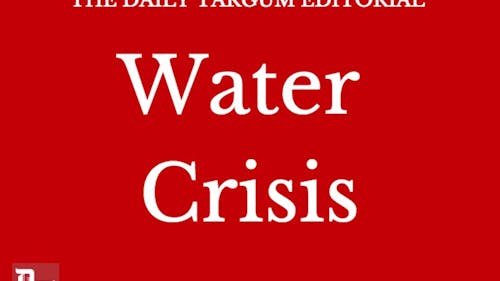EDITORIAL: Water shortages are pressing issue

Though it may appear as though we have an unlimited supply of it, the world is arguably quickly approaching a global water crisis. As has been examined with regard to individual regions of the world, a water crisis can have rippling effects that are severely detrimental to all facets of a society. It has become apparent that climate change plays a sizable role in the prominence of water issues, and could lead to humanitarian crises of unsettling proportions. But what really is the extent of the issue, and is there anything a community like Rutgers’ can do to help?
As a result of waste and pollution, exacerbated by climate change, communities across the globe have become uninhabitable, causing a vacuum of refugees and over population. The Fertile Crescent, which encompasses Egypt, Israel, Lebanon, Kuwait, Jordan, Cyprus, Iran, Syria and Iraq, can act as one sort of case study regarding this water shortage situation. Climate change in the Fertile Crescent, according to a study done by Proceedings of the National Academy of Sciences of the United States of America, directly correlates to the extreme drought in Syria that played a major role in the state’s violent uprising beginning in 2011. Due to poor governmental policies and water shortages, millions of Syrian farmers were forced to evacuate to overcrowded cities as climate refugees. Water shortages coupled with ruined land and corruption had, in turn, led to social chaos.
Water shortages in the United States seem on the face to be a problem only for the Western states, but evidence suggests the issue is set to spread across the country. Demand for water as a result of population growth and energy needs coupled with the water restrictions that have arisen from droughts, floods and climate change may very well lead to a nationwide water crisis in years to come.
Water issues like the aforementioned are closer to home than one may think. According to a recent Open Public Record Act (OPRA) request filed by New Brunswick Today, four New Brunswick public schools tested positive for lead levels upward of 70 times the acceptable amount — Paul Robeson Community School, New Brunswick Middle School, McKinley Community School and New Brunswick High School. Even at low levels of exposure, young people can be severely affected by contact with lead. Kids can experience lower IQ levels, problems with hearing, difficulty focusing and keeping attention and poor academic performance, according to the United States Environmental Protection Agency (EPA).
But the grim “Hunger Games” sort of images that may come to mind when one thinks about a water crisis may not necessarily ever have to come to fruition. Many organizations, including some from Rutgers, are working to make this worry a non-issue. Specifically, a group of students created a company called SULIS. The group invented a solar powered water purification system for communities without access to clean water. The device contains a catalyst, and when one pours water into it all that needs to be done is let it sit in the sun. The end result will be a clean, usable water. Additionally, large corporations, such as Lockheed Martin, have been becoming increasingly involved with solving this issue. Lockheed Martin is one of the largest aerospace/technology companies worldwide, and claims it could reduce energy waste in the desalination process by 20 percent. Using a device called a Perforene Graphene Filter, Lockheed Martin is primarily benefiting oil and gas wastewater. While they are researching more widespread and advanced technology applications, others need to be involved in this effort as well.
If there is one thing everyone in the world depends on, it is water. A water crisis is not merely a problem of a distant land or of the distant future, but may very well affect anyone reading this in their own lifetime. It seems reasonable to encourage Rutgers and its community to lend some serious thought to this issue and to get more involved in preventing it.
The Daily Targum's editorials represent the views of the majority of the 150th editorial board. Columns, cartoons and letters do not necessarily reflect the views of the Targum Publishing Company or its staff.



